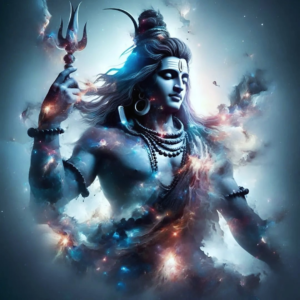
Introduction:
Shivratri, or the Night of Shiv, is a sacred Hindu festival celebrated with reverence and devotion. Falling on the 14th night of dark fortnight in the month of Phalgun, this auspicious occasion holds profound significance for millions of devotees around the world. As we prepare to immerse ourselves in the divine energy of Lord Shiva, let’s explore the rituals and practices that can bring immense benefits on this sacred day.
Fasting and Purity:
One of the central practices of Shivratri is fasting, known as “Upvaas” or “Vrat”. Devotees abstain from consuming food throughout the day, symbolizing self-discipline and purification. Fasting not only detoxifies the body but also focuses the mind on spiritual contemplation.
Night Vigil and Worship:
Shivratri is synonymous with staying awake throughout the night, engaging in prayer, meditation, and recitation of sacred texts. Participating in the night vigil, or “jaagran”, is believed to evoke divine blessings. The rhythmic chanting of Shiv mantras creates a spiritual atmosphere, fostering a deep connection with the cosmic energy.
Shiva Puja:
Performing Shiva Puja is a fundamental aspect of shivratri celebrations. Devotees offer various items such as milk, fruits, flowers, and bael leaves to the Shiva Lingam, symbolizing purity and devotion. The rituals bath of the Shiva Lingam with milk, honey, yogurt, ghee, and water signifies the purification of the soul.
Meditation and Yoga:
Shivratri provides an ideal opportunity to delve into meditation and yoga practices. By channeling one’s energy inward,practitioners can achieve mental clarity and heightened spiritual awareness. The stillness of the night becomes a conducive environment for introspection and connecting with the divine consciousness within.

Visiting Siva Temples:
Pilgrimage to Shiva temples on Shivratri is a common tradition. Devotees seek the divine presence of Lord Shiva, offering prayers and seeking blessings for spiritual growth and well-being. The vibrant atmosphere in these sacred spaces amplifies the collective energy of devotion.
Reading Shiva Scriptures:
Reading contemplating scriptures dedicated to Lord Shiva, such as the Shiva Purana and Rudras Samhita, can deepen one’s understanding to the divine attributes of Shiva. The teachings within these texts guide devotees on the path of righteousness and spiritual evolution.
Charity and Compassion:
Acts of charity and compassion hold special significance during Shivratri. Helping those in need, feeding the hungry, and extending a hand to the less fortunate are considered virtuous deeds that align with the compassionate nature of Lord Shiva.
Inner Silence and Reflection:
Shivratri is not only an external celebration but also an opportunity for internal reflection. Embracing moments of silence and solitude can aid in connecting with the inner self and fostering a sense of peace and tranquility.
Chanting Maha Mrityunjaya Mantra:
The Maha Mrityunjaya Mantra, a powerful invocation dedicated to Lord Shiva, is chanted fervently during Shivratri. Devotees belive that reciting this Mantra can overcome the fear of death and bring about spritual rejuvenation.
Cleansing the Mind and Heart:
As devotees engage in rituals and practices, Shivratri encourage the cleansing of not only the physical body but also the mind and heart. Letting go negative thoughts, embracing forgiveness, and cultivating love contribute to spiritual upliftment.
Conclusion:
In conclusion, Shivratri is a prfound celebration that transcends religious boundaries, inviting individuals to connect with the divine essence within and around them. By immersing ourselves in the rituals and practices associated with this auspicious day, we open ourselves to the transformative energy of Lord Shiva, paving the way for spiritual growth, inner peace, and divine blessings. May this Shivratri be a journey of self-discovery and profound connecion with the eternal consciousness of Lord Shiva.
Shivratri, or the Night of Shiv, is a sacred Hindu festival celebrated with reverence and devotion. Falling on the 14th night of dark fortnight in the month of Phalgun, this auspicious occasion holds profound significance for millions of devotees around the world. As we prepare to immerse ourselves in the divine energy of Lord Shiva, let’s explore the rituals and practices that can bring immense benefits on this sacred day.
Fasting and Purity:
One of the central practices of Shivratri is fasting, known as “Upvaas” or “Vrat”. Devotees abstain from consuming food throughout the day, symbolizing self-discipline and purification. Fasting not only detoxifies the body but also focuses the mind on spiritual contemplation.
Night Vigil and Worship:
Shivratri is synonymous with staying awake throughout the night, engaging in prayer, meditation, and recitation of sacred texts. Participating in the night vigil, or “jaagran”, is believed to evoke divine blessings. The rhythmic chanting of Shiv mantras creates a spiritual atmosphere, fostering a deep connection with the cosmic energy.
Shiva Puja:
Performing Shiva Puja is a fundamental aspect of shivratri celebrations. Devotees offer various items such as milk, fruits, flowers, and bael leaves to the Shiva Lingam, symbolizing purity and devotion. The rituals bath of the Shiva Lingam with milk, honey, yogurt, ghee, and water signifies the purification of the soul.
Meditation and Yoga:
Shivratri provides an ideal opportunity to delve into meditation and yoga practices. By channeling one’s energy inward,practitioners can achieve mental clarity and heightened spiritual awareness. The stillness of the night becomes a conducive environment for introspection and connecting with the divine consciousness within.
Visiting Siva Temples:
Pilgrimage to Shiva temples on Shivratri is a common tradition. Devotees seek the divine presence of Lord Shiva, offering prayers and seeking blessings for spiritual growth and well-being. The vibrant atmosphere in these sacred spaces amplifies the collective energy of devotion.
Reading Shiva Scriptures:
Reading contemplating scriptures dedicated to Lord Shiva, such as the Shiva Purana and Rudras Samhita, can deepen one’s understanding to the divine attributes of Shiva. The teachings within these texts guide devotees on the path of righteousness and spiritual evolution.
Charity and Compassion:
Acts of charity and compassion hold special significance during Shivratri. Helping those in need, feeding the hungry, and extending a hand to the less fortunate are considered virtuous deeds that align with the compassionate nature of Lord Shiva.
Inner Silence and Reflection:
Shivratri is not only an external celebration but also an opportunity for internal reflection. Embracing moments of silence and solitude can aid in connecting with the inner self and fostering a sense of peace and tranquility.
Chanting Maha Mrityunjaya Mantra:
The Maha Mrityunjaya Mantra, a powerful invocation dedicated to Lord Shiva, is chanted fervently during Shivratri. Devotees belive that reciting this Mantra can overcome the fear of death and bring about spritual rejuvenation.
Cleansing the Mind and Heart:
As devotees engage in rituals and practices, Shivratri encourage the cleansing of not only the physical body but also the mind and heart. Letting go negative thoughts, embracing forgiveness, and cultivating love contribute to spiritual upliftment.
Conclusion:
In conclusion, Shivratri is a prfound celebration that transcends religious boundaries, inviting individuals to connect with the divine essence within and around them. By immersing ourselves in the rituals and practices associated with this auspicious day, we open ourselves to the transformative energy of Lord Shiva, paving the way for spiritual growth, inner peace, and divine blessings. May this Shivratri be a journey of self-discovery and profound connecion with the eternal consciousness of Lord Shiva.
Show your support on Youtube: www.youtube.com/@devilmusichr8660
Gmail: himanshurao470@gamil.com

